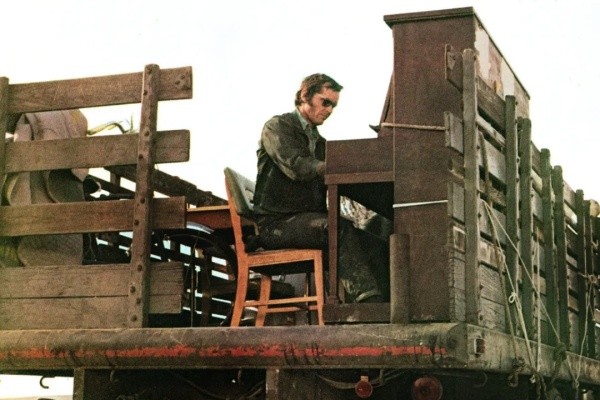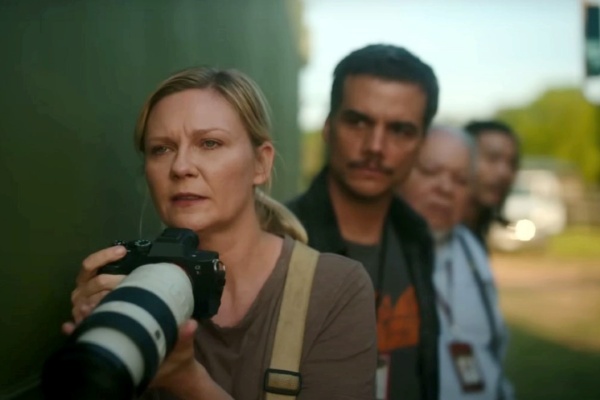This bold existentialist work from Russian master Tarkovsky compels and frustrates with equal measure.
Dir. Andrei Tarkovsky
1979 | Soviet Union | Drama/Mystery/Sci-Fi | 161 mins | 1.37:1 | Russian
PG (passed clean)
Cast: Alisa Freyndlikh, Aleksandr Kaydanovskiy, Anatoliy Solonitsyn
Plot: A guide leads two men through an area known as the Zone to find a room that grants wishes.
Awards: Won Prize of the Ecumenical Jury (Cannes)
Source: MosFilm
Accessibility Index
Subject Matter: Moderate/Existential
Narrative Style: Complex
Pace: Slow
Audience Type: General Arthouse

(Reviewed on Criterion Blu-ray – first published 23 Jun 2012)
Spoilers: No
I admit it is not easy to write a less-than-glowing review on one of cinema’s greatest works without incurring the wrath of Tarkovsky die-hards, and cinephiles who stand by what they think is the great Russian director’s finest work, and one of the most accomplished, albeit unconventional, science-fiction films ever made.
But I try my best.
Stalker, as it is called, is an intriguing picture from the onset, a film with a first act that I feel ranks among the very best in cinema – shot in high-contrast brown monochrome in a setting that is indescribably desolate and decidedly apocalyptic.
From the prologue, Tarkovsky imprints his visual style onto the celluloid. His trademark long takes, still shots, and close-ups on characters’ faces are evident, providing the film with some of the most haunting yet beautiful imagery ever captured.
“It is so quiet out here, it is the quietest place in the world.”
There is a lengthy transition scene as the Stalker (Alexander Kaidanovsky) leads two curious men – simply known as the Writer (Anatoly Solonitsyn) and the Professor (Nikolai Grinko) to the ‘Zone’, where the bulk of the entire picture plays out. The ‘Zone’ is an alien place guarded by armed soldiers. Within it lies the ‘Room’, a place that is believed to grant the innermost wishes of anyone who dares to step foot in.
Stalker is a film of many layers. Yet ironically, it is a minimalist work that questions the ideality of values that place humanity seemingly above other beings – desire, love, consciousness, hope, or being devoid of them in a constant search by the individual to seek purpose.
Like Solaris (1972), Tarkovsky’s seminal science-fiction film about isolation, the struggle for identity, and the desire to feel loved, Stalker is very much an existentialist film with rich, intellectual pickings, only that it can be frustrating to absorb what goes on in the film.
“My conscience wants vegetarianism to win over the world. And my subconscious is yearning for a piece of juicy meat. But what do I want?”
Although the film’s glacier pacing is deliberate, it occasionally takes the viewer out of the film. The meandering dialogue doesn’t help, though it must be said that to fully appreciate this bold Tarkovsky film, one has to be in a meditative, permeable mood.
The ‘Zone’ is shot in full colour, like Oz in The Wizard of Oz (1939). Natural elements combine to compelling effect as we feel the hidden force of the ‘Zone’. Water is a visual motif in Stalker – from the muddy environment in the first act to rain, waterfalls, dripping water, deep pools of water in the ‘Zone’.
The film’s sound design is also brilliant as it incorporates the hallucinatory sounds of an industrial locomotive passing, a music score with a hypnotic flute that seems to transcend the aural space of the film, and yes, lots of water sounds to keep those hydrophiliacs happy.
The film contains 142 shots in 161 minutes, with an average shot length of more than one minute and many shots lasting for more than four minutes.
While Stalker can be frustrating to watch at times, one has to admire the vision of Tarkovsky, who based his film loosely on the novel ‘Roadside Picnic’ written by his screenwriters Arkadiy and Boris Strugatskiy.
The history behind the making of Stalker could only emphasise Tarkovsky’s genius – the first cut was destroyed in a lab accident, and he had to reshoot the entire picture with a new director of photography.
Seven years after the release of Stalker, two major events happened that cemented Tarkovsky’s reputation as one of the most enigmatic filmmakers who ever lived – the Chernobyl disaster that speculators were convinced he prophesied with Stalker, and his inevitable passing from lung cancer caused by the toxic environment that Stalker was shot in. And there the myth of the legend was born. But still, I prefer Solaris.
Grade: A
Trailer:
Music:












[…] structure, not to mention also being sandwiched by two lengthy sci-fi epics—Solaris (1972) and Stalker (1979)—with legendary reputations, it is becoming increasingly clear that it might just be […]
LikeLike
[…] Criterion Collection […]
LikeLike
[…] garnered comparisons to Andrei Tarkovsky’s Stalker (1979), which to me is far more meditative and in the vein of slow cinema, and Aleksei German’s […]
LikeLike
[…] to say that I’m Andrei Tarkovsky complete. Nostalghia, his penultimate feature made between Stalker (1979) and The Sacrifice (1986), might be his most ponderous work, yet it could also be his […]
LikeLike
As the Laws of Attraction and Intention state: Thoughts become things. But when sci-fi like Solaris and Stalker dramatize how easily our weaknesses lead to dangerous consequences from what our minds manifest, it can indeed make the best statements on being careful of what we wish for. I still haven’t seen Stalker yet. But reviews including yours as well as a most intriguing trailer make me think about seeing it sometime. Thanks.
LikeLiked by 2 people
It definitely needs 3 hours of uninterrupted attention!
LikeLiked by 1 person
[…] therapist with inner powers (there is an unmissable reference to that last scene in Tarkovsky’s Stalker (1979)), who leaves behind his sad past and tries to come to terms with who he is in the […]
LikeLike
[…] maybe?), to the stupendous if somewhat nauseating final long take that recalls the virtuosity of Stalker (1979), to the honourable use of Bach’s ‘St. Matthew Passion’ on more than one inspired […]
LikeLike